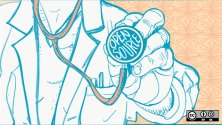Last week, the second annual TEDxChapelHill filled the Varsity Theatre in Chapel Hill, NC. The seven amazing speakers—from the fields of ICT4D (information, communication, and technology for development), mHealth, engineering and design, and medicine—talked about their projects, trials, and vision for the future. They spoke about the critical importance of local involvement, capacity building, end-user engagement, efficiency, a respect for low-tech solutions and high-tech innovative partnerships to make tools affordable and accessible.
I heard a lot that night about the value of polydisciplinary teams and initiatives, strong messaging and measuring, strategic collaboration, clear objectives, scalability, and sustainability. When it comes to global health, the consensus seemed to be that good technology is technology that works whether it is "low" or "high" technology; and this technology should be made for, and sometimes by, the end-user in a way that makes it available and affordable in local, resource-challenged settings.
For those of you who missed the phenomenal event, I can say emphatically: it was a motivating and inspiring evening. Here’s a recap, and I hope to see you next year.
Josh Nesbit, CEO of Medic Mobile, (formerly FrontlineSMS:Medic) and an IntraHealth board member, created a split screen presentation for “Healthies and Techies,” pitching to both the health- and technologically minded. He encouraged greater openness and multidisciplinary collaboration and gave examples of open source tools that use simple, locally appropriate communication technologies to support community health worker coordination and management, community mobilization for vaccination and satellite clinics, logistics and supply chain management, referrals, routine data collection, and mapping of health services. These tools include FrontlineSMS, OpenMRS, Ushahidi, Google Apps, and HealthMap.
Jon Gosier, a software developer and founder of Appfrica, Hive Colab, SwiftRiver and a core staff member of Ushahidi, spoke about local capacity, innovation and production, and the significance of two-way channels of information. He reminded the audience that crowdsourcing is in many ways a very old innovation but with new technologies we are able to tap into collective ideas and serve people better and in new ways. Gosier puts this into action by building open software platforms that make sense of streams of real-time data, which democratize access to the tools used for drawing insight from data feeds that would otherwise be overwhelming. He also trains software developers in countries like Uganda and Kenya to do this independently.
David Weinfeld created a tailored “serious gaming” experience for the audience with Screach, a SXSW Best App, which is built with an open source code base. Using the audience members’ smartphones, Screach was able to turn the theatre screen into a giant game board quiz on global health and technology with real-time voting and Facebook avatars bouncing across the screen. Screach’s open language ScreachML means that creatives and designers can build fully interactive experiences at no cost and imagine the many ways the tool could be used in development, health care, and education.
Dr. Radhika Chigurupati spoke about the potential of telemedicine technologies to make health services more accessible for remote and rural communities and the need for open source mobile technologies that provide a universal clinical platform that is more efficient, farther reaching, and easily adapted to local needs. Dr. Chigurupati’s insights build on her work with SANA, a company that offers open source data collection and collaboration platforms for clinical research and evidence-based health care delivery. Her focus is on telemedicine and mHealth initiatives in the developing world, including mobile clinical decision support tools for both non-professional health workers and non-specialist health professionals.
Jonathan Kuniholm, an engineer and founder of The Open Prosthetics Project, spoke about the lack of innovation in technology for amputees despite government funding. Kuniholm, who is a former Marine officer who lost his right arm in an explosion in Iraq in 2005, uses a prosthetic arm based on a 1912 patent because he likes it better than newer versions. He challenged the audience to imagine what life would be like had phones, computers, and cars developed at such a slow rate. He is working to promote open hardware and design technologies to encourage greater sharing and innovation. His work is based on his non-profit organization, which posts its research on prosthetic hardware designs on the Internet, allowing individuals and companies to access the information free of charge.
Robert Malkin, a professor at Duke and founder of Engineering World Health, talked about his epiphany moment on the burdens, dangers, and added cost created by donating medical equipment to resource-poor health facilities. Malkin shared with the audience a story from a trip to Nicaragua when the surgical lights caught fire during an operation because the donated fixtures required bulbs that were not locally available. He described warehouses being rented by clinics to store the tons of unusable medical equipment donations and cited a survey in which most doctors in the developing world said they had too much, not too little equipment. Malkin advocated for engineers to design medical equipment for local production, or partial local production, to promote local capacity, create local jobs, and allow machines to be fixed locally when they break down.
University of North Carolina Chancellor Holden Thorp, who opened the evening, spoke to the audience about the value of entrepreneurial thinking to solve the largest issues of our time, stating that while most people equate entrepreneurship with business, some of the greatest innovations are happening at the university level when it comes to development and social change.
All of these talks are now available on youtube, and photos from the event are on Flickr. More details, pictures, and speaker bios can be found at TEDxChapelHill. TEDxChapelHill is sponsored by IntraHealth International, and many of the 2011 speakers are on the IntraHealth OPEN Council.

Opensource.com
What to read next





1 Comment